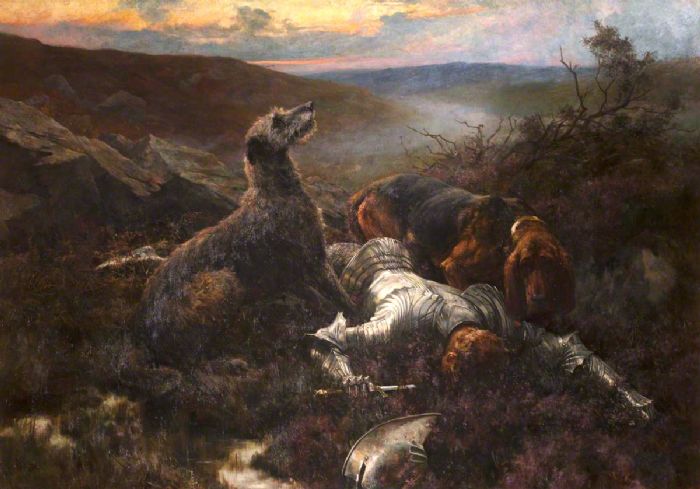The debate on what to feed
'After Chevy Chase' (Battle of Otterburn 1388), (oil on canvas 1894). by Herbert Thomas Dicksee.

Another very contentious topic, and everyone is an expert! All sorts of experiences, ideologies, and misconceptions. Some of the most prolific breeders internationally and with perceived expertise have strident views and sometimes peddle misinformation. And with almost religious zeal.
It’s hard to move people off their entrenched positions so don’t bother. Dogs are very adaptable regarding diet. So, whatever works best for you. Just be logical about considering the information out there, as anecdotal ‘evidence’ gleaned from Facebook, forums, messaging apps, chat rooms and other social media and websites is notoriously dubious.
There are advocates of extremes such as:
- a fully meat diet, versus, a vegan diet,
- grain free, versus, grain based,
- a full commercial diet, versus, home formulated ‘fresh’ diet,
- raw, versus, cooked, and
- no supplementation, versus, supplementation.
There is no secret, just common sense. A good safe diet is predominantly dry dog kibble moistened with cooking by-products, leftovers and table scraps, things like:
- vegetable offcuts and peelings (not potato peel),
- meat, chicken and fish trimmings and scraps,
- rice and pasta leftovers,
- eggs and eggshells,
- pan rinsings (but not excessively oily or fatty) and drainings from boiled vegetables, rice, and pasta,
Some human foods are not safe for dogs. Avoid:
- grapes, raisins (can cause kidney injury), sultanas, currants, rhubarb,
- onions, garlic, chives, spinach,
- raw potato (especially the peelings), tomatoes, beetroot
- large amounts of fat (which can lead to pancreatitis) or fatty trimmings, especially pork and ham,
- chocolate, coffee, alcohol,
- mushrooms, avocados, macadamias,
- artificial sweetener, or anything containing Xylitol (such as chewing gum),
- nutmeg, heavily seasoned or salted foods,
- cooked bones (which can splinter and injure the mouth, throat, stomach or intestines, or cause a bowel ostruction or constipation), and
- yeast dough (which can swell and rupture intestines).
Dogs are not true carnivores and are more like omnivores. The raw mince that many people get from the pet shop, or the knackery can have additional risks and a predominantly meat diet especially in growing pups can cause developmental problems. Meat can be deficient in calcium, iodine, phosphorous, sodium, magnesium, copper, iron and vitamins A, D and E. People then practise supplementation which can be seriously problematic. Animal nutrition is a complex field and even most vets have only studied the basics (it is a specialised field). Be wary of advice from pet shop staff or vet clinic nurses; they often get their ’knowledge’ from pet food sales reps. The better manufacturers produce excellent balanced food for dogs of different types and stages of life, and their nutritionists are at the top of the field. Having said that, some of the ‘premium’ manufacturers are expert at separating people from their hard-earned cash by clever marketing and playing at the heart strings of pet owners who want the best for their pets (and confuse higher price with better quality).
Some minerals and trace elements have antagonistic relationships and supplementation with one can cause a deficiency in another. Other relationships cause toxicity due to an induced excess. Simple advice is don’t supplement! Years ago, some breeders routinely supplemented with calcium powder and the risk was upsetting the all-important calcium-to-phosphorus ratio (which can cause bone development issues in growing pups and bone damage in older dogs). Supplementation with vitamins is also risky as excesses and imbalances can induce illness (e.g., vitamin A excess can result in bone disease, also too much liver or fish liver oil can cause excesses in vitamin A). Unless your dog has been diagnosed with a condition leading to a deficiency (e.g., thyroid problems) sound advice is don’t supplement, and feed a balanced diet based on a quality kibble. Leave balancing the nutrients to the experts.
As for price, shop around. Supermarkets often have the best prices for brands that they stock. Online purchasing can be very cost effective for larger purchases and may include free delivery. You can sometimes pay less than half the price that pet shops retail the “premium” brands just by comparing prices or switching to competitor brands with similar formulations. Usually the ingredients used are accessible by all manufacturers and quite often are the same regardless of the marketing pitch.
Some people swear by fresh pet mince (‘natural’ as opposed to processed) from the pet shop or local knackery. Feeding uncooked mince from these sources’ risks worm infections particularly tapeworms (most concern being hydatid). Kangaroo and venison mince is mostly field slaughtered and partly dressed before processing at knackeries. Other mince can be from animals slaughtered at the knackery (horses or cattle not fit for human consumption) or dead stock picked up from farms. Bacterial contamination could be a risk (especially salmonella). Often the meat is treated with chemical preservatives to prevent deterioration and extend shelf life. So much for natural! And people insist their supplier wouldn’t do that (????).
Feeding should be appropriate to the dog's age (puppy, adult, or senior). Deerhounds grow quickly, and pups and juniors require quality nutrition to support proper development.
Clean, fresh water should be always available.
Strenuous exercise is not recommended before or after feeding to minimise the risk of bloat, and a period of rest should always follow exercise and before and after feeding. Some advocate several smaller meals per day rather than one large meal.
Initially, follow the diet recommendations given to you by the breeder. If your dog has any feeding problems, consult the breeder.
https://www.dogsaustralia.org.au/getting-a-dog/whats-cooking
https://www.dogsaustralia.org.au/getting-a-dog/a-dogs-breakfast
